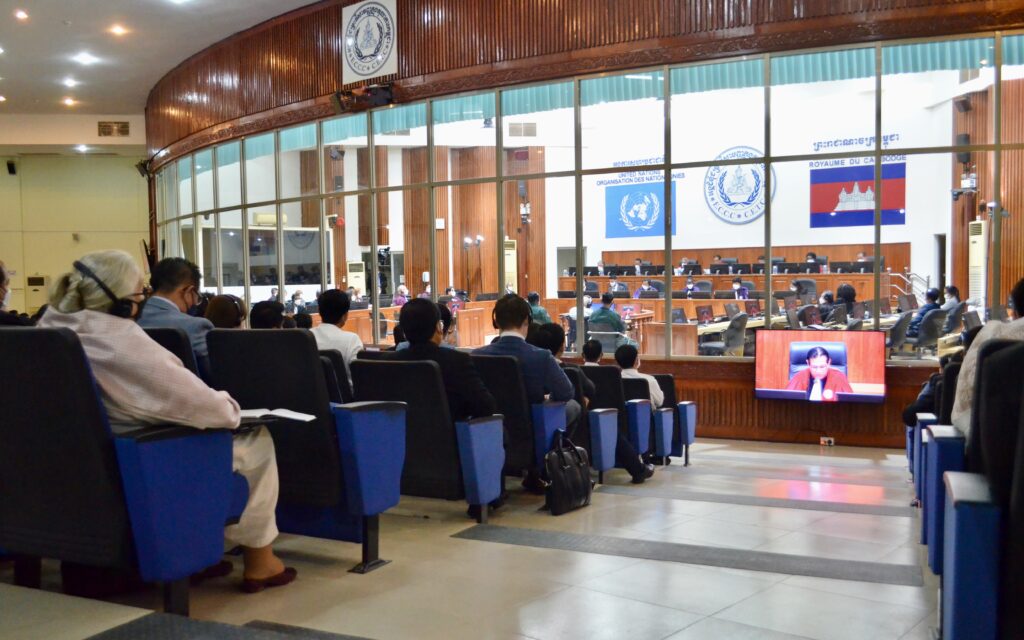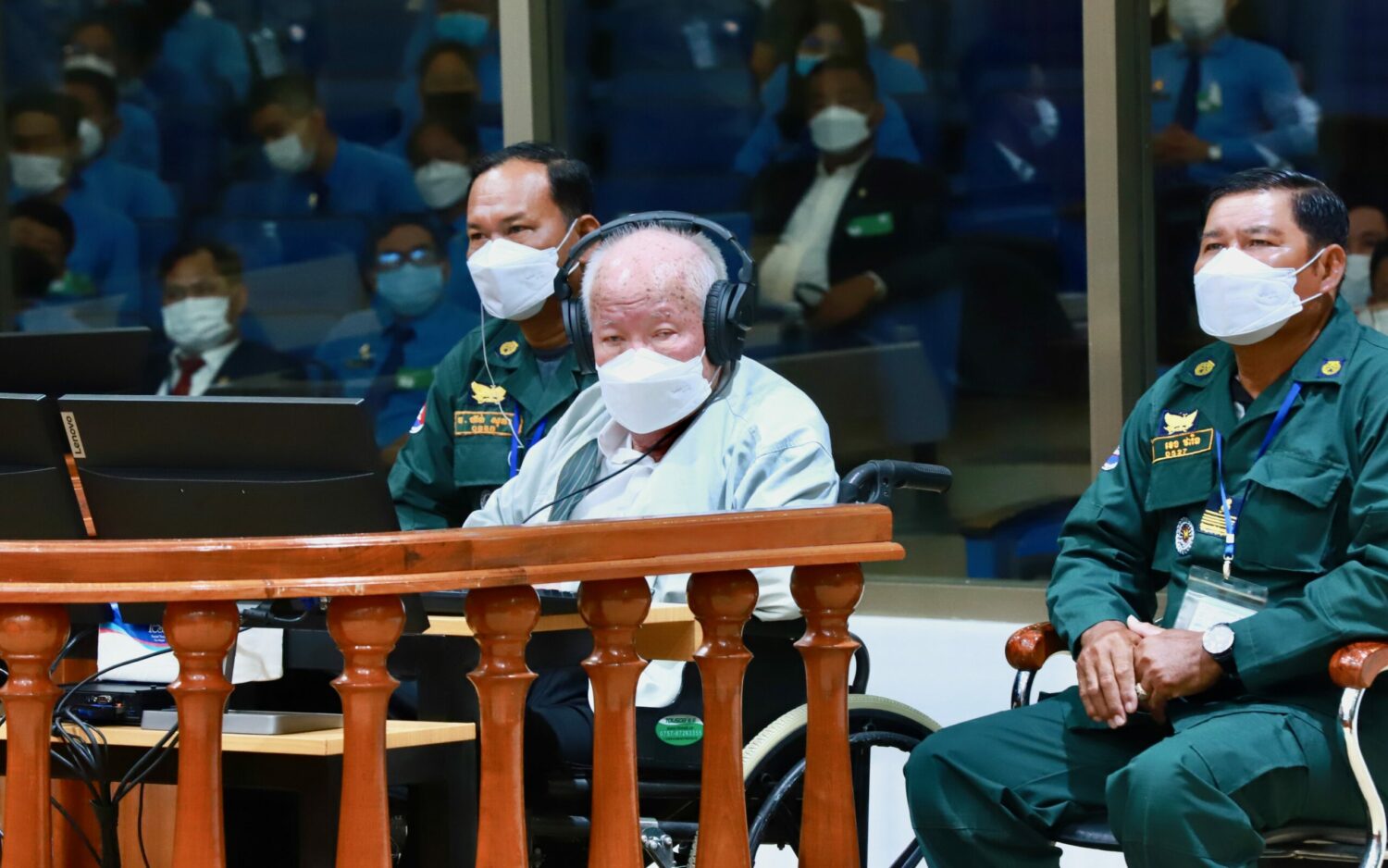On Thursday morning, the Khmer Rouge tribunal upheld all but two of a slew of convictions against former regime head of state Khieu Samphan, effectively ending the court’s judicial proceedings.
The tribunal, known officially as the Extraordinary Chambers in the Courts of Cambodia (ECCC), has yet to release its written judgment on the procedural appeals filed by Samphan’s defense lawyers. But on Thursday morning, judge Kong Srim delivered a roughly two-hour summary of that document affirming 14 convictions of crimes against humanity originally handed to Samphan by a lower Trial Chamber in 2018 in its ruling on Case 002/02 — the second half of a massive case that covered most of the Khmer Rouge’s brutal policies.
Case 002/01 had also convicted Samphan and Khmer Rouge second-in-command Nuon Chea for crimes related to the forced evacuation of residents from Phnom Penh and elsewhere, as well as the execution of prisoners of war.
Almost all points of Samphan’s appeal were met on Thursday by a standard refrain: “The Supreme Court Chamber concludes that Khieu Samphan has failed to demonstrate error on the part of the Trial Chamber with respect to these issues.”
These upheld convictions focus mostly on crimes committed at specific worksites, security centers and other locations across Cambodia. Samphan’s legal defense sought mostly to minimize his role in the Khmer Rouge leadership and deny knowledge of crimes as they were happening.
The convictions include the crimes of torture; genocide; enforced disappearance; persecution on political, racial and religious grounds; and the enslavement, deportation and “extermination” of Cambodia’s ethnic Vietnamese minority. Also key to Thursday’s proceedings was a conviction for the Khmer Rouge practice of forced marriages, as well as sexual violence and rape through the consummation of such marriages.
“Today’s judgment, and the other judgments in Case 002/01, will forever stand as a bulwark in the case of revisionism,” said Fergal Gaynor, the international co-prosecutor and an Irish national. “This court has made an immeasurable contribution to the global effort to combat impunity for mass atrocities.”
The Khmer Rouge ruled the country from 1975-1979 and installed a harsh authoritarian regime with utopian socioeconomic goals. An estimated 1.5 to 2 million people died from starvation, forced labor and execution under communist rule.
The ECCC is a “hybrid” court made up of domestic and international components — including in its funding, judges and other personnel — while remaining an organ of the Cambodian national court system. Its promoters have said the court is a strong example for a professional judiciary in Cambodia. Meanwhile, its detractors have pointed to the politicization of the country’s domestic courts as a hurdle to finding true justice for Khmer Rouge victims.
The court’s operations from 2005 to this August have cost almost $337.7 million, most of which has come from international partners.

Samphan, 91, was silent through the proceedings as he sat in a wheelchair flanked by guards. With a white medical mask covering the lower half of his face, Samphan showed no visible expression. At one point he asked to be taken to the bathroom, but otherwise said nothing.
Samphan had earlier been sentenced to life and held at an ECCC facility through his convictions in Case 002/01. He’d been a co-defendant in both halves of the case with Nuon Chea, who had been known as “Brother No. Two” in rank only below Pol Pot. The court convicted both men, but Chea died soon after while appealing the judgment.
Case 001 centered on S-21 camp leader Kang Kek Iew, known more commonly by his alias Duch, who was convicted of several crimes against humanity for the torture and execution of prisoners in his custody. The Supreme Court sentenced Duch to life imprisonment in 2012 – after he’d appealed a shorter sentence and lost – and he died in 2020.
Samphan’s national defense lawyer Kong Sam Onn said at a press conference after the summary judgment that his client has no option for further appeals at this time. Both Sam Onn and his international counterpart, French attorney Anta Guisse, emphasized that they’re still waiting to see the official written judgment of Samphan’s case. They’d earlier appealed a similar delay with their client’s original convictions.
“Now the decision in the judgment cannot be used, it’s not a decision that is enforceable, even if it is a final judgment,” Sam Onn said.
Guisse questioned how the Supreme Court had reached some of its decisions, saying she was “waiting impatiently” to see its full reasonings on subjects such as forced marriage, which she said was addressed under different legal interpretations at the time than those used today.
“History has been tried, and I think it’s a pity that maybe the arguments regarding the exact role of the defendant were not heard in their totality,” she said, adding that the court decision was “difficult to comment on today because we don’t have all the grounds.”
The Supreme Court reversed two convictions against Samphan, one for murder at the Phnom Kraol Security Center and the other for persecution on political grounds of so-called “new people” at the 1st January Dam worksite. The first conviction had been based on the deaths of two prisoners, with the case against Samphan relying on testimony from witnesses who were deceased. Samphan had no opportunity to confront these witnesses, judge Srim said in his summary, and so went the conviction.
The persecution case at the dam worksite centered on discrimination against people the Khmer Rouge expelled from Phnom Penh — a forced population transfer for which Samphan was also convicted in the first half of Case 002. The Supreme Court reversed the conviction here, Srim explained, as it did not find a specific violation of existing rights laid out in either international or treaty law at the time of the events in question.
The prosecution made just one appeal, asking the court to expand its conviction of Samphan on charges of overseeing forced marriages and sexual violence to include male victims. Though the Trial Chamber had previously convicted Samphan on that charge, it had left out male victims. The Supreme Court accepted this appeal and expanded the earlier conviction to include men.
With the trial portion to be officially concluded with the publication of the written judgment by the end of this year, the ECCC will move on to archiving its vast trove of evidence. It will also continue over the next three years to provide some closure to its Civil Parties, a dwindling group initially of more than 3,800 survivors of the Khmer Rouge regime who have been included in the proceedings.
Sous Rizean, 38, came to the ECCC from Kampong Cham province with a group of more than 40 other people of the Cham Muslim minority. Though too young to see the Khmer Rouge regime herself, Rizean said her family had suffered greatly under their rule.
“I didn’t see what it was like under the Khmer Rouge, and my children won’t either,” she said, explaining she’d come to experience the tribunal for herself. “I will tell the next generation of this, as my mother and grandmother told me about the Khmer Rouge.”













